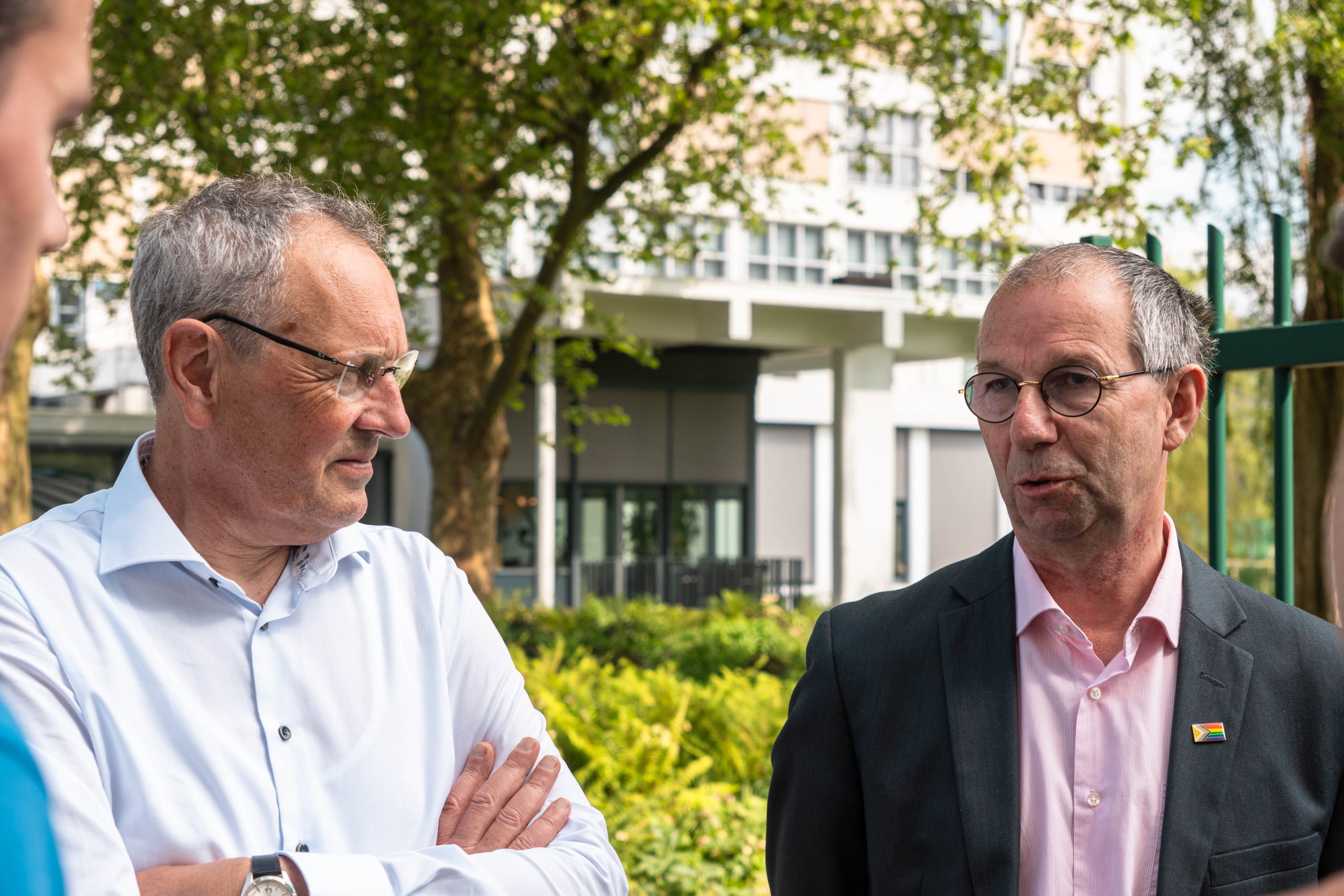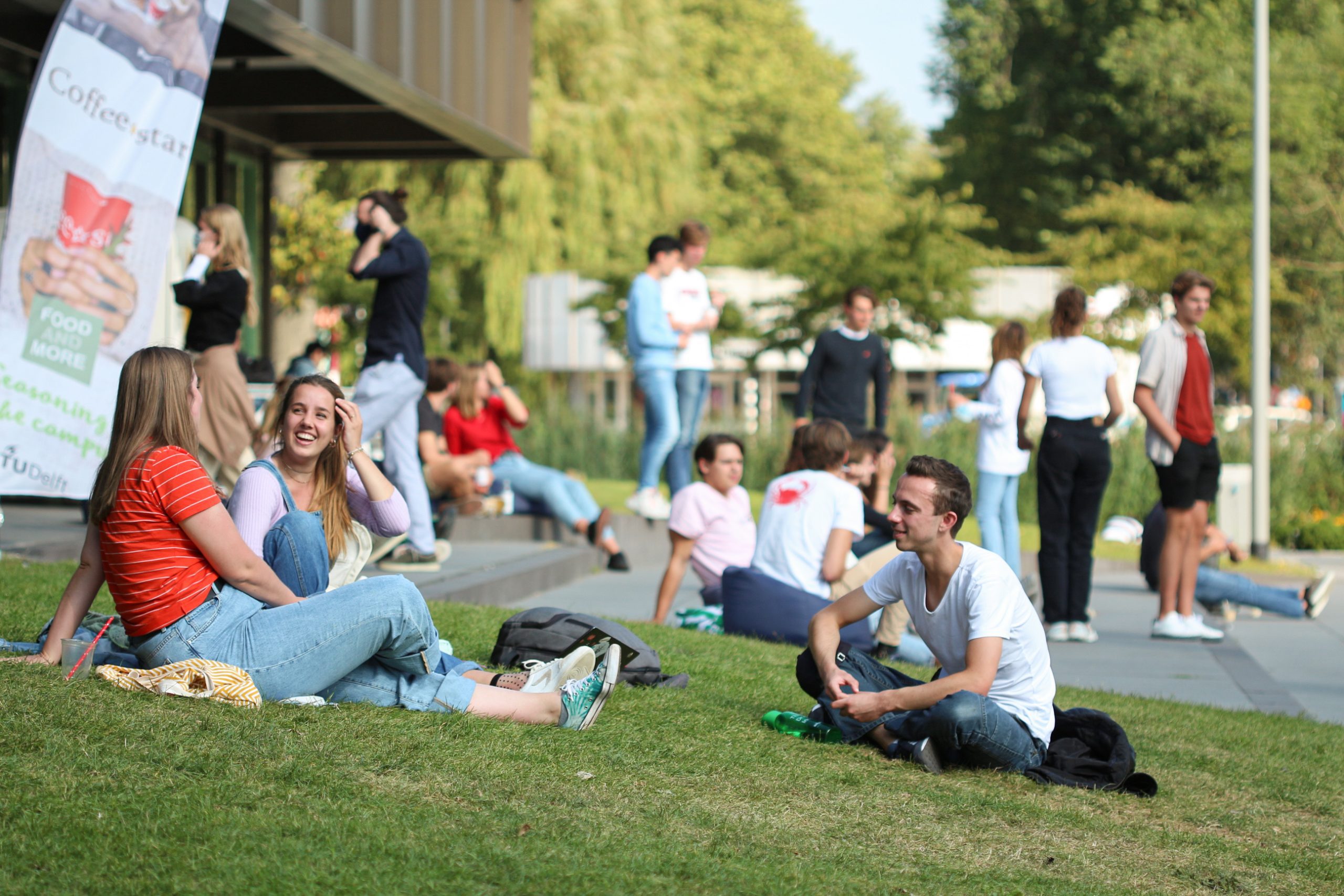Reducing the number of students in Delft by offering research and learning opportunities in Rotterdam. This idea should put less pressure on the city and the campus, but we are not yet there. In the meantime, what should be done about the pressure on Delft? And what will the relationship between the various locations be? Delta asked Vice-Rector Rob Mudde and Fred van Keulen, the Dean of ME.
(Photo: Justyna Botor)
Earlier this year, the ‘Delft, where our foundations lie’ advice, whose name says much about the relationship between the planned TU Delft branch in Rotterdam and its Delft mother, was issued. Fred van Keulen, Dean at Mechanical Engineering (ME), was Chair of the committee that drafted this recommendation. Vice Rector Magnificus and Vice Chair of the Executive Board Rob Mudde and the Executive Board took the advisory on board.
They both offer reassurance should anyone be concerned that TU Delft will slowly disintegrate. Mudde says that ‘the home of the university’ will remain in Delft in the future. “And this will stay that way for the next 50 to 100 years. The classic engineering disciplines are and will stay in Delft. They are extremely valuable and we excel in them. Should we locate elsewhere, we will not duplicate what we are doing here.”
Van Keulen understands the uneasy feeling that some people have about the new branch. “They are wondering what will happen to them. It is for this reason that we chose the title ‘In Delft ligt het fundament’ (the foundation lies in Delft). TU Delft will retain its strong links with Delft.” It is mostly intended to give a direction as nothing definite has been stated. This is for the next phase.
Why was this advice necessary?
Mudde explains. “The origins lie in the issue of our relationship as TU Delft with the city on the one hand, and society’s demand for more engineers on the other. That demand is huge so thinking about scaling up TU Delft is a logical step. It’s just that there are already a huge number of students in Delft, which puts a lot of pressure on the city. So the idea is to we move some of our activities to Rotterdam.
There is much work to be done in Rotterdam, but the Executive Board also needed advice on what establishing a branch in Rotterdam would mean for the campus in Delft.”
‘We have a huge campus in Delft which we could make more use of’
“Time is needed to establish ourselves in Rotterdam,” says Van Keulen. “You also need to make plans in Delft itself to streamline the expected growth effectively. So we consciously look at what we could do in a relatively short space of time.”
What is the most important advice?
“I cannot state just one thing,” says Mudde, “it’s about the whole and about cohesion. It is a given that we have a huge campus in Delft which we could do more with. There are several options to think about. One of these is creating productive activities. There is a significant ecosystem of companies of various sizes on campus, which is good for employment opportunities and economic activities.
We also need to liven up the campus, both for residents and for our own students. We could provide evening entertainment for some of the students here. We could open up the campus more often for people from the city, if people would be interested. Fred often refers to the klaverjasclub (klaverjas is a popular card game in the Netherlands, Eds.) as a metaphor. Why would you not open it up for them in the evenings, with a cup of coffee during the game and a beer afterwards? This would make it much more lively.”
Van Keulen adds that “This could be an option in my Faculty as you can open parts of the building. With just a couple of minor adaptations, you could easily house these kinds of activities.
‘Unknown is unloved. This must change’
There are also other low hanging fruit. For example, there are plenty of interesting activities on campus, but they are announced in academic English. So you do not reach everyone. Simply adapting your communications is not that expensive or time consuming, and you could achieve a lot.”
What thinking lies behind this?
“Unknown is unloved. This must change,” says Mudde. “I think it would be useful if we bring students and other residents of Delft into contact with each other in different ways. One person could indeed be playing cards while another a little further down is studying. I would really like it if students were not in a permanent student bubble, but also met people from the city. We live in a community together. It helps if you know each other.”
Residents of the city experience quite a lot of trouble from students and student life. How can this plan reduce this?
“I live in the city centre myself, and I see positive things like cheerfulness and enthusiasm,” says Mudde. “But the other side of the coin is that over the last few years we have often heard about problems from the Municipal Council and the Municipality. We have shown residents associations the broad lines of the advice.

This fits our intentions to come into contact with people. We have colleagues that go to the residents, talk to them, and ask for feedback on what we at TU Delft could do differently. The OWee is a good example of this. We draw on the advice of residents, whether asked or not, to continue improving things.”
‘Students do a lot in and for the city. It is not only creating unrest’
“We have also been honest to the residents associations,” Van Keulen adds. “You cannot change everything in just one go. We have now received some advice and this must lead to concrete actions. This takes time.”
What should be done physically on campus to relieve the city? The advice mentions food and drinks, and shops.
Mudde answers, saying “Yes, these were the suggestions. Food and drinks is relatively simple – coffee, beer and so on. There are already some options. I’m not sure if we really need more. We would like to make the ground floors or the lower floors of some buildings more lively, including in the evening hours. We need to offer something just as attractive as the city centre.”
Van Keulen adds that “The advice is not about new buildings or building student housing. These are needed too, but that would take too long for what we want to achieve with this project. In this phase our priority is to seek collectivity, including with the Municipality. For example, I see that the faculties have few connections with the city. If that changes, you can seek each other out more quickly.”
What benefit would this be to the ordinary people?
“It is a step by step process,” says Van Keulen. “Relations are good between the Executive Board and the Mayor and Municipal Executive. These relations need to be at other levels too as TU Delft and the city belong to each other.
As an example, one of my colleagues and his students help out at a community centre to address problems with physical mobility in the neighbourhood. If the Faculty and the Municipality would have more contact, that project could be made much more visible to more people.
Students do a lot in and for the city. It is not only creating unrest. There is a lot of voluntary work, but it is all so fragmented that it does not get the attention it deserves.”
‘There should be more direction, with people who are dedicated to working on this’
Mudde adds that “There should be more direction, with people who are dedicated to working on this. That would help reduce the disturbances and close the gap. To give one very practical example: we hear from residents around the campus that they cannot enter or exit the neighbourhood during rush hour because of the continuous stream of cyclists. I do not say that we can sort this out immediately, but we can include it when we think about lecture timetables. And we are talking about a new route along the Gelatinebrug bridge.”
What do you expect from students?
“There simply are very many students in Delft. We try to make them aware of this. If every individual student has just one incident with their neighbours, it may seem minimal for them, but it amounts to thousands of incidents. If you are able to reduce that number, the pressure will ease. Student associations can help, as can others such as Duwo as a housing provider.”
What now?
The ‘Delft, where our foundations lie’ advice is there and the advisory committee has done its job. A core team including Chair Dick van Gameren, the Dean of Architecture and the Built Environment, will now prepare a proposal for implementation that should be ready soon. The priority is that the recommendations ‘can be organised in conjunction’, said a project officer. This means that current activities should be more effective and visible. The core team is not doing this alone, but gathers input from staff members at different faculties and departments through workshops, focus groups and interviews.
- More information can be found on the intranet.
Do you have a question or comment about this article?
s.m.bonger@tudelft.nl


Comments are closed.